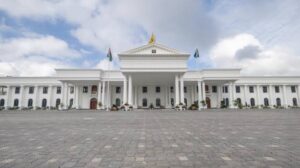Charles Hinga Mwaura, commonly known as PS Charles Hinga, is the Principal Secretary (PS) for Housing and Urban Development in Kenya.
His role has put him at the center of big government projects, most notably the Affordable Housing Program, a key pillar of President William Ruto’s ambitious projects.
However, despite his prominent position, Hinga has been plagued by numerous allegations of corruption and mismanagement, which have raised concerns about his integrity and the transparency of the projects under his supervision.
One of the major accusations against Hinga involved the alleged mismanagement of funds allocated for the Affordable Housing Program under Uhuru’s administration of which he was still maintained by President William Ruto to the same docket.
Critics argue that the project, which was meant to provide low-cost housing to millions of Kenyans, has been marred by irregularities, inflated costs, and kickbacks.
These allegations suggest that the funds intended for public benefit may have been diverted into the pockets of corrupt officials and contractors, with Hinga being a key figure in these shady dealings.
Another scandal linked to Hinga concerns the controversial was the Nairobi Metropolitan Services (NMS).
The NMS, which was established to oversee key functions in Nairobi County during the previous administration, had been accused of being a breeding ground for corruption, with Hinga allegedly playing a big role in facilitating dubious contracts and tenders.
The lack of transparency in the NMS’s operations and the absence of accountability mechanisms had fueled suspicions that public resources are being siphoned off by a well-connected elite.
Hinga has also been accused of using his position to amass personal wealth through questionable means.
Reports suggest that he has acquired massive assets, including properties and businesses, which are disproportionate to his known income.
This has led to calls for an investigation into his wealth, with many Kenyans demanding to know the source of his sudden financial success.
Despite these allegations, Hinga has consistently denied any wrongdoing, dismissing the accusations as baseless and politically motivated.
He has maintained that all the projects under his watch have been conducted with the highest levels of transparency and accountability.
However, the growing chorus of voices calling for his resignation and the launch of a thorough investigation into his activities suggests that these allegations cannot be easily brushed aside.
The case of PS Charles Hinga highlights the broader issue of corruption in Kenya’s public sector.
As a high-ranking government official, Hinga’s alleged involvement in corruption undermines public trust in the government and hampers efforts to improve the lives of ordinary Kenyans.
The ongoing scandals surrounding him serve as a reminder of the urgent need for greater transparency and accountability in the management of public resources.
Even though PS Charles Hinga continues to play a crucial role in Kenya’s housing and urban development sector, the persistent allegations of corruption against him cannot be ignored.
It is imperative that the relevant authorities conduct a thorough investigation into these claims to ensure that public resources are used for their intended purpose and that those involved in corruption are held accountable.
Without such action, the credibility of Kenya’s government and its commitment to fighting corruption will remain in question.





















Add Comment